Death in Oslo Read online
Page 5
‘Shame on you,’ she muttered to herself and lit a cigarette.
The news of the American president’s disappearance had not yet made any visible or audible impact on the celebrations. Faint echoes of the shouts, hurrahs and general noise on Karl Johan bounced between the government buildings. The people who hurried past on the pavement were laughing and smiling. Maybe they didn’t know. Even though the news had leaked several hours ago now, and the two main TV channels had interrupted the morning’s programmes with regular newsflashes, it was as if the nation refused to be distracted from the great annual celebration of itself.
It felt good to have a smoke.
She hesitated for a moment before lighting up another cigarette. Her eyes roamed from a group of journalists who had gathered in front of the building, up to the green bulletproof windows on the sixth floor. They were so obviously different from the rest of the building. She had often wondered why the Minister of Justice should have bulletproof windows in his office, when he went shopping in the local supermarket on his own and had no more than an ordinary Securitas burglar alarm in his home. That’s just the way it is, she said to herself; she always, with absolute loyalty, simply accepted things as they were and had been decided.
A man looked down at her.
She sheepishly lifted her hand in greeting. He waved back. It was Peter Salhus. A good man. A man you could trust. Always friendly whenever they met, attentive and alert, unlike so many of the other important people who came and went in the minister’s office and barely even registered her existence.
Beate Koss dropped her cigarette butt on the ground, and stubbed it out with her shoe. She looked up again and thought she saw Salhus saying something, before he closed the curtains and turned back to the room.
A police car drove past, slowly and quietly, but with its blue light flashing.
‘Now that we’re alone,’ Peter Salhus said when only the Minister of Justice and the Chief of Oslo Police were left in the office behind the green windows, ‘I just wanted to ask . . .’ He scratched his beard and swallowed. ‘Hotel Opera,’ he blurted out and looked directly at the Chief of Police, Bastesen. ‘Hotel Opera!’
‘Yes . . .’
‘Why?’
‘I don’t quite understand your question,’ Bastesen said, offended and with a furrow on his brow. ‘It was—’
‘When we’ve got the Continental and the Grand,’ Salhus interrupted, making a great effort to keep his voice down. ‘Wonderful, traditional, good hotels. We have elegant VIP accommodation and we have . . .’ He lowered his voice even more and tapped the map of the centre of Oslo with his finger. ‘Kings have stayed here. Princesses and presidents. Albert bloody Einstein . . .’ He stopped and took a deep breath. ‘God knows how many other celebrities, film stars and Nobel Prize winners have slept happily and safely in their beds just here . . .’ He almost made a hole in the map with his index finger. ‘And then someone decides to put the American president in a bloody transformer kiosk between a central station full of junkies and a bloody building site. Jesus Christ . . .’
He straightened his back and pulled a face. A faint humming from the air-conditioning was the only sound in the room. The minister and the Chief of Police leant forward and carefully studied the map on the table, as if Madam President might be hiding somewhere there, between the street names and the shaded blocks.
‘What on earth were you thinking?’
The Minister of Justice took a couple of steps back. Bastesen brushed some invisible dust from the front of his uniform.
‘Well, that attitude’s not going to get us anywhere,’ he said calmly. ‘May I just remind you that we are responsible for bodyguard services now. That means the security of all objects, both nationals and non-nationals. And I can assure you that—’
‘Terje,’ Salhus cut in and puffed out his cheeks before exhaling slowly. ‘I apologise. You are absolutely right. I shouldn’t get so agitated. But . . . we know the Grand! We have experience in making the Continental secure. Why on earth . . .’
‘Give me a chance to answer, man!’
‘I suggest we sit down,’ the Minister of Justice said in a tense voice.
Neither of the two took any notice of his suggestion.
‘They had just completed the presidential suite,’ Bastesen explained. ‘The hotel is preparing to welcome the cultural elite. Major stars. Up until now, they’ve had a reputation for not quite . . . Well, let’s just say they’re not quite in the same class as the Grand, but when the new opera house is finished, the location will be a huge competitive advantage and . . .’ He drew a circle round Bjørvika with his finger. ‘Right now this is Spaghetti Junction and not particularly attractive, it’s true. But the plans are . . . The presidential suite met all our requirements, in terms of aesthetics, practicality and security. Superb view. They added a couple of rooms on the ninth floor to an already existing suite, which is . . . And what’s more . . .’ he gave a crooked smile, ‘it was actually quite reasonable.’
An angel passed through the room. Salhus stared at Bastesen in disbelief; Bastesen stared at the map.
Eventually the Director General of the PST groaned. ‘Reasonable! The American president comes to Norway, the security operation is massive, perhaps the biggest we have ever had, and you choose a hotel that is . . . cheap! Cheap!’
‘As I’m sure is also the case in your division,’ Bastesen continued calmly, ‘it is the responsibility of the head of every government agency to save public money wherever possible. We undertook a total analysis of Hotel Opera and compared it with the other hotels you just mentioned. The Opera came out best. Overall. And may I remind you that Madam President travels with a pretty large security operation herself. The Secret Service has of course inspected the area. Thoroughly. And had very few objections, as far as we were led to believe.’
‘I think then we’ll leave it at that,’ the Minister of Justice said. ‘Let’s stick to the actual situation and not get distracted by what might, could or should have been done differently. I suggest that we . . .’
He went over to the door and opened it.
‘Where are the drawings?’ Peter Salhus asked and looked at the Chief of Police.
‘Of the hotel?’
Salhus nodded.
‘We’ve got them down at HQ. I’ll get you copies straight away.’
‘Thank you.’
Salhus held out his hand in a conciliatory gesture. Bastesen hesitated and then finally shook it.
It was already past two o’clock. Still no one had heard from Helen Bentley. Still no one knew exactly when she had disappeared. And the Director General of the PST and the Chief of Oslo Police still did not know that the architectural drawings of the Hotel Opera that they had back in that bleak, curved building at Grønlandsleiret 44 were incomplete and inaccurate.
VI
The man woke up with his ear full of vomit.
The stench seared his nose and he tried to get up. His arms wouldn’t do as he wanted. He lay back down, resigned. He was too far gone now. He had started to puke. He couldn’t remember the last time he had had to get rid of all the shit he poured into himself. Several decades of practice had made his stomach immune to most things. The only thing he didn’t drink was meths. Two years ago, after a real glut of contraband, he’d ended up in hospital with a couple of brethren spirits. All of them with methanol poisoning. One of them had died. The other one went blind. Whereas he got up after five days and walked straight home, more alert than he had been for a long time. The doctor had said he was lucky.
Practice, he had said to himself. It’s having enough practice that counts.
But he avoided meths.
The flat was a tip. He knew that. He should do something about it. The neighbours had started to complain. About the smell, primarily. He had to do something, or they’d throw him out.
He tried to get up again.
Shit. The whole world was spinning.
He had an intense pain in
his groin and sick in his hair. If he rolled his lower body off the sofa, he might be able to get up from there. If it weren’t for the bloody cancer, he’d be doing all right. He wouldn’t have thrown up. He would have had the energy to get up.
Slowly, to save what little muscle he had left in his scrawny body, he wedged his leg against the coffee table. He then managed to get up into a kind of sitting position, with his knees on the matted carpet and his body in a resting position against the sofa, as if in prayer.
The TV was on, with the volume too loud.
He remembered now. He had turned it on when he came home at the crack of dawn. As in a distant dream, he remembered that someone had knocked on the door. Heavily and loudly, the way his bloody neighbours always did, to pester him both night and day. Fortunately nothing more had happened. No doubt the pigs had other things to do on a day like today, instead of coming to pick up a poor old soak.
‘Hurrah for the seventeenth of May,’ he wheezed with great effort, and finally managed to creep up on to the sofa.
‘It is still uncertain when President Bentley disappeared from the hotel. . .’
The sound penetrated the man’s tired brain. He tried to find the remote control in the chaos on the table. A packet of crisps that had spilled out over old newspapers was now drenched in beer from an upturned can. Someone had eaten nearly all the pizza that a mate in the backyard had given him the day before, and that he had been saving for today. He had no idea who.
‘As far as Dagsrevyen is aware, the American president is. . .’
In many ways it had been a damn good night.
Real alcohol, not the usual rubbish and shit. He had had half a bottle of Upper Ten whisky to himself. And more, if he was honest. He had helped himself to some of the stuff the others had with them when he thought no one was looking, which had only resulted in one brawl. But that was what it was like when you were with your mates. He’d managed to stash a couple of minis in his inside pocket when it was all over. Hairymary wouldn’t mind. What a girl, eh! She had landed on her feet when she was picked up by that policewoman and her filthy-rich dyke friend. Turned into a proper little lady’s housekeeper in the West End. But Hairymary hadn’t forgotten where she came from. She might never leave that fort of a flat that she had holed herself up in, but she did send money to Backyard Berit twice a year, on the 17th of May and Christmas Eve. Then the old gang had a party with food and the real thing.
He shouldn’t be feeling so bad after such a good night.
It wasn’t the alcohol, it was the bloody cancer in his balls.
The light on the fjord had been beautiful when he’d wandered through the town in the early morning – it must have been around four. The Russ was still being rowdy and carrying on, of course, but whenever there was a quiet moment he had taken time to sit down. On a bench or on that fence by the rubbish bin where he had found a full, unopened bottle of beer.
The light was so beautiful in spring. The trees somehow seemed friendlier, and even the hooting of car horns was less aggressive when he stumbled out on to the road a bit too suddenly and the drivers had to brake.
Oslo was his town.
‘The police ask anyone who might have seen anything to. . . ’
Where the hell was the remote control?
There. At last. It was hidden away under the pizza box. He turned down the volume and sank back into the sofa.
‘Shit,’ he said in a flat voice.
They were showing a picture of some clothes. A pair of blue trousers. A bright red jacket. Some shoes that just looked like any old shoes.
‘According to police information, this is the outfit that President Bentley was wearing when she disappeared. It is important that. . .’
It was at ten past four.
He had just looked at the clock on the tower outside the old Østbanen station when she went by. Her and two men. Her jacket was red, but she was far too old to be one of the Russ.
Fucking hell, his balls were burning.
Had someone disappeared?
It had been a good night. He wasn’t too bad, so he had managed to stagger home through the town, full and happy. The streets were decorated with colourful garlands and he had noticed how clean everywhere was.
The smell of sick was bothering him now. He had to do something. He had to tidy up a bit in here. Clean, so that he wouldn’t get kicked out.
He closed his eyes.
This bloody cancer. Well, everyone dies of something or other, he comforted himself. That’s life. He was only sixty-one, but that was old enough, really, when he thought about it.
Slowly he slipped sideways and into a deep sleep, with his ear in his own vomit once again.
VII
‘… and there you have it.’The Prime Minister sat back in his chair. There was silence in the large room. The air smelt dank. The place had been closed for a long time. Peter Salhus clasped his hands behind his neck and let his eyes wander round the room. There was a long, counter-like piece of furniture along one wall. Otherwise, the room was dominated by a huge meeting table with fourteen chairs around it. There was a plasma screen on one of the walls. The loudspeakers were on a glass shelf down by the floor. A faded map of the world hung on the wall opposite.
‘So we’re going to have these . . .’ the Chief of Oslo Police, Terje Bastesen, looked as if he actually wanted to say gorillas, but tactfully said something else, ‘these agents hanging over our shoulders. Sticking their noses into everything we find, everything we do, anything we might think or believe. OK.’
Before the Prime Minister had a chance to answer, Peter Salhus took a breath. He leant forward suddenly and propped his arms on the table. ‘First of all, I think one thing should be made absolutely clear,’ he said in a measured voice. ‘And that is that the Americans will certainly not let their president disappear into thin air without doing their utmost, one . . .’ he held a finger in the air, ‘to find her. Two . . .’ another finger pointed to the ceiling, ‘to catch whoever it is who has kidnapped her. And three . . .’ he broke into a smile, ‘to move heaven and earth – and hell if needs be – to ensure that that person or those people are punished. And let’s just say that that the punishment won’t be meted out in this country.’
The Minister of Justice gave a dry cough. Everyone looked at him. It was the first time he had opened his mouth in the meeting.
‘The Americans are our friends and allies,’ he said. His voice had an edge of formal panic that made Peter Salhus close his eyes, so that he wouldn’t interrupt. ‘And we must of course do whatever we can to help them. But let me make clear . . .’ the minister hit the table hard with his fist, ‘that we are in Norway. Under Norwegian jurisdiction. The Norwegian police will lead the investigation. Let there be no doubt about that. And when the culprit has been caught, then a Norwegian court . . .’
He was shouting, and heard it himself. He broke off. Coughed again, and prepared to continue.
‘With all due respect . . .’ Peter Salhus’ voice sounded rough in comparison. He got up from his chair. The Minister of Justice remained seated with his mouth open. ‘Prime Minister,’ Salhus continued, without even looking at the most senior politician responsible for the Norwegian police, ‘I think we could do with a reality check.’
The Director of Police, a thin woman in full uniform who had largely sat and listened throughout the meeting, leaned back and crossed her arms. Her thoughts seemed to be elsewhere most of the time and on two occasions she had left the room to answer calls. Now she seemed to be more interested and looked straight at the Director General of the PST.
‘I would just like to draw your attention to the fact that—’ interjected the obviously angry Minister of Justice.
‘I think we should take a moment to clear this up,’ the Prime Minister interrupted, with a gesture that presumably was intended to reassure, but instead was more like one used when scolding a disobedient child. ‘So, Salhus, in what respect do you think that we are not in touch with
reality? What is it that you’ve seen that the rest of us haven’t?’
His eyes, which naturally already looked narrow in his round face, were now like two slashes of a scalpel.
‘Is it just me . . .’ Salhus threw open his hands, ‘is it just me to who finds this situation completely absurd?’ Without waiting for an answer, he continued: ‘An entire small air force, in addition to Air Force One. Around fifty Secret Service agents. Two armoured cars. Sniffer dogs. A bunch of special advisers, which basically means FBI agents, if any of you were wondering . . .’
He tried not to look at the Minister of Justice, who was now sitting down and aggressively stirring his coffee with a pencil.
‘That is the President’s entourage on a state visit to Norway. And do you know what? That is surprisingly little!’ He leant forward over the table with both his hands placed firmly on the tabletop. ‘Little!’
He let the word hang in the air, as if measuring the shock effect.
‘I’m not quite sure that I understand what you’re getting at,’ the Director of Police said. ‘We all know perfectly well how many people the President has with her, and it’s not—’
‘It’s in fact very few,’ Peter Salhus repeated. ‘It’s not unusual for the President to be accompanied by an army of two to three hundred agents. Personal cooks, a fleet of cars. A huge van full of modern communications equipment. Military ambulances. Bulletproof screens for use during official appearances, other IT equipment, entire kennels of sniffer dogs . . .’ He pulled a face again as he straightened up. ‘But the lady comes to Norway with a really rather meagre entourage. Sorry . . .’
The apology was slipped in quickly and he lifted an acknowledging hand to the Prime Minister.

 A Grave for Two
A Grave for Two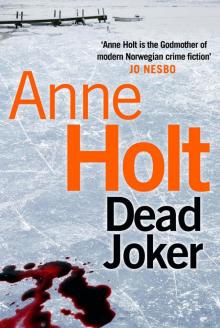 Dead Joker
Dead Joker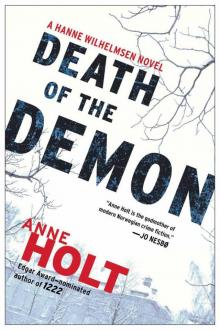 Death of the Demon: A Hanne Wilhelmsen Novel
Death of the Demon: A Hanne Wilhelmsen Novel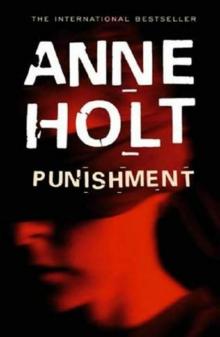 Punishment aka What Is Mine
Punishment aka What Is Mine Beyond the Truth
Beyond the Truth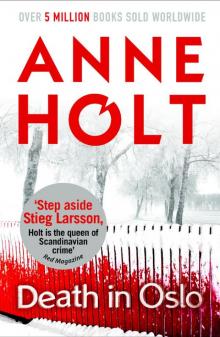 Death in Oslo
Death in Oslo The Blind Goddess
The Blind Goddess What Never Happens
What Never Happens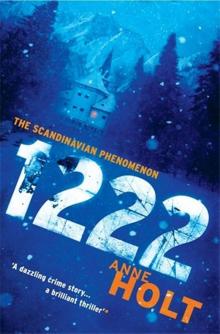 1222
1222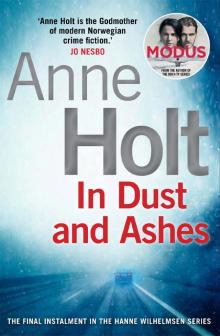 In Dust and Ashes
In Dust and Ashes Odd Numbers
Odd Numbers What is Mine
What is Mine What Dark Clouds Hide
What Dark Clouds Hide Blessed Are Those Who Thirst
Blessed Are Those Who Thirst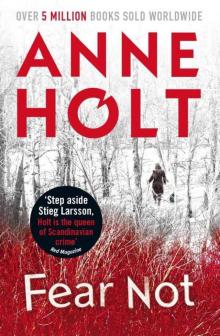 Fear Not
Fear Not No Echo
No Echo Hanne Wilhelmsen - 01 - The Blind Goddess
Hanne Wilhelmsen - 01 - The Blind Goddess